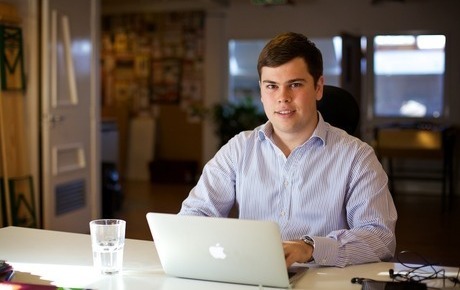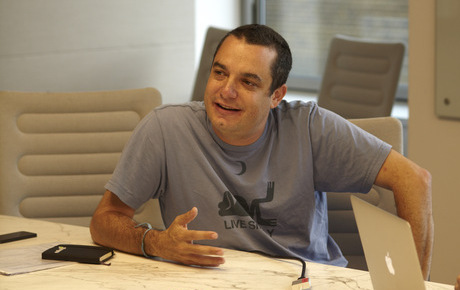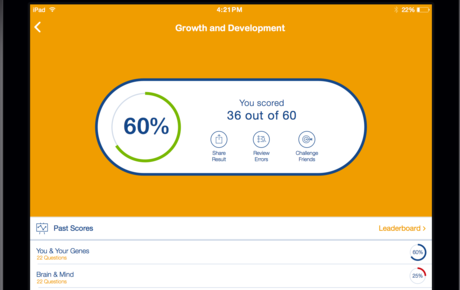Despite most industries experiencing a rapid disruption from the increasing usage of mobile, education is one which has been slow and sometimes frustrating in its adoption.
It was a reliance on textbooks and uninspiring resource material that led George Burgess to decide producing his own educational apps would be a good step.
Not having any development or technology engineering experience himself, Burgess turned to the online freelance auction arena to secure himself a developer overseas who could help to build the early smartphone app.
Describing himself as ‘one of those strange kids who was entrepreneurial’, Burgess had already been running his own filming business with a friend at school – recording events at other locations.
It was money made through this venture that provided him with the small amount of financial power needed to get his educational app development going.
‘When I left school I raised a small friends and family funding round and hired an iOS developer,’ Burgess says.
‘I had no experience when it came to hiring developers, and actually turned to LinkedIn to find an engineer who just so happened to have gone to my old school.’
New direction
The Gojimo business he runs has now pivoted to a point where the material for its educational apps are sourced from academic publishers such as Oxford University Press and Pearson, but in the early days Burgess had to secure his own content.
The first contributor for Burgess and his original EducationApps venture turned out to be one of his own teachers, who caught the teenage entrepreneur emailing his overseas developer in class and asked what he was up to.
Throwing himself into the cut and thrust world of FTSE 100 dealmaking, Burgess then took his product offering out into the market and penned partnerships with the likes of BBC Active. Formerly known as BBC Worldwide Learning, BBC Active is part of Pearson Education. Closing deals with these kind of businesses gave Burgess the confidence he needed to push on with his venture, he says, but it was always considered a lifestyle interest at first.

Burgess’ experience of making mobile work in education helped in signing publishers
Having amassed himself 100-odd individual apps which were requiring expensive and time-consuming maintenance, Burgess had to make a decision whether to package up a business to take forward or leave it as it was.
‘It wasn’t really maintainable, that’s why I pivoted [to create Gojimo]. I realised what we were doing was just picking the same template and replicating for a particular publisher,’ he explains.
‘It was fun and making a bit of money, but not very revolutionary. I wanted to try and achieve something.’
Education to education
Having decided to drop out of Stanford University in the US and go full time, Burgess hit the fundraising trail to raise funds for growth.
Burgess has now closed a venture capital deal worth $1 million, with contributions coming from Index Ventures and the founders of Innocent Drinks.
On his decision to partner with the two investors, Burgess explains, ‘Index are really good with early-stage seed funding, they do a huge amount there.
‘My concern with other VCs was that we’d be at the bottom of their list. With Index, they provide a huge amount of support – setting up events and really caring.’
It was through a talk at his old school that Burgess first came into physical contact with Innocent Drinks. Having been ‘that weird kid’, Burgess wrote to Innocent when he was 13 years-old to find out more information on the business, and then met the company’s creative director while at a talk during his gap year after finishing school.
‘They were beginning to look more at the investments side. At the time they didn’t want to invest as I was a full-time student and didn’t have any intention to drop out. When I did, I reached out and they got involved.
‘When I eventually met with Jon and Adam [founders of Innocent and partners at their consumer venture fund JamJar Investments] they were absolutely brilliant people. I’d admired Innocent growing up as their brand was so strong.’
Securing investment from JamJar, Burgess says, is much more than getting funds. The firm provides a non-tech perspective, the outside perspective which he believes is so valuable to combat getting caught up in the ‘bubble’.
Burgess is one of the youngest entrepreneurs, at 21, to be backed by Index Ventures and joins the firm as a portfolio company a week after The Cambridge Satchel Company bagged a $21 million investment.

Saul Klein is leading the investment for Index Ventures
More on Index Ventures investments:
- MyHeritage nets return capital from Index Ventures
- Imran Amed’s The Business of Fashion dressed for growth
- Secret Escapes aims for membership growth
Market penetration
On the back of achieving 250,000 downloads in 12 months when his venture went under the umbrella branding of EducationApps, Gojimo will now take the form of an all-in-one mobile learning platform. Burgess has already boosted the team he has to the current level of five and will continue to look at product development.
‘We’re also looking to include some elements of gamification, looking at how students can challenge each other,’ he says.
‘We previewed the app to teachers at the BETT show [UK’s biggest education technology exhibition] and are enabling bulk sales for schools.’
With Gojimo sourcing and licensing its content directly from academic publishers, Burgess does not have to worry about the previous unenviable task of updating content in-house.

Gojimo allows students to purchase textbooks, study guides and quizzes
Shaking up the education sector is something which Burgess believes is long in the making. And with updates to the curriculum, he says, publishers have the chance to embrace technology and become more accessible.
With most of us engaging in our smartphone or tablet hundreds of times a day, Burgess sees it as only a matter of time before children and teachers are doing just the same whilst at school.
‘The reason they haven’t been used in education is a lack of resources. One of the biggest problems schools face is wanting to use technology, but they then can’t buy textbooks to use on them.
‘We are trying to bring that content to the end user. If you compare a kid with a heavy bag of books to one with an iPad, the new way is accessible, portable and navigable by topic.’






